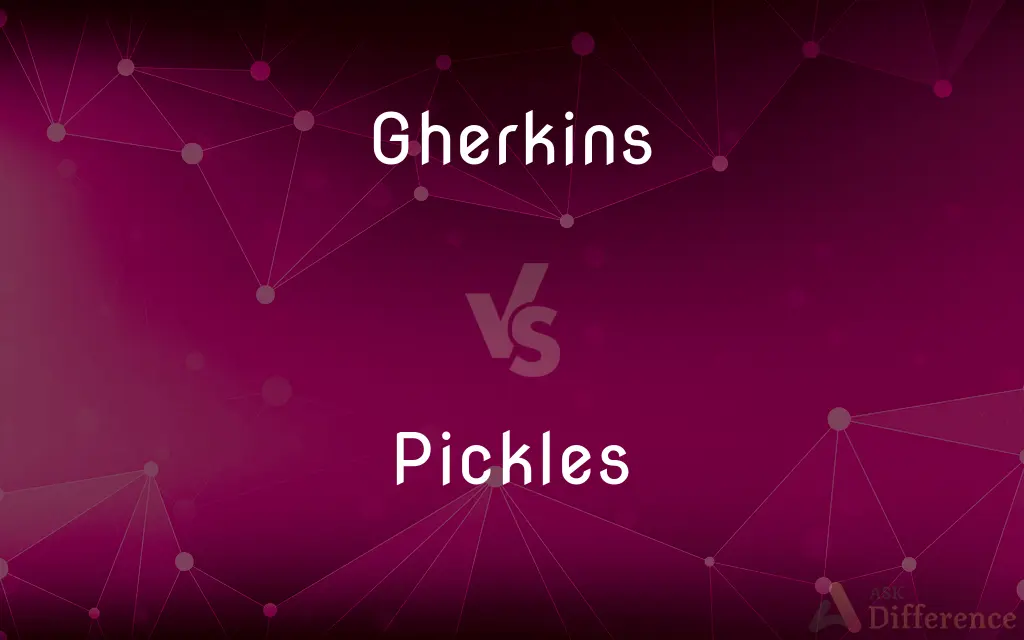Gherkins vs. Pickles — What's the Difference?
Edited by Tayyaba Rehman — By Fiza Rafique — Published on November 26, 2023
Gherkins are small cucumbers pickled in vinegar or brine. Pickles refer to any vegetable preserved in a vinegar or brine solution.

Difference Between Gherkins and Pickles
Table of Contents
ADVERTISEMENT
Key Differences
Gherkins and pickles are terms that often lead to culinary confusion. At a fundamental level, gherkins are a specific type of pickle. Gherkins refer to a variety of small cucumbers that are pickled in vinegar or brine. Originating from Europe, these tiny, crunchy cucumbers are often enjoyed on their own, added to sandwiches, or used as garnishes.
On the other hand, pickles is a more generalized term that pertains to any vegetable that has been preserved in a solution of vinegar, brine, or a fermenting agent. While cucumbers are the most commonly pickled vegetables in many Western countries, a plethora of vegetables like beans, carrots, cauliflower, and more can be pickled. The pickling process not only preserves the vegetables but also imparts a tangy flavor to them.
To clarify further, all gherkins are pickles, but not all pickles are gherkins. When someone mentions pickles, they could be referring to any pickled vegetable, while gherkins are specifically the small cucumbers that have undergone the pickling process.
In essence, the difference between gherkins and pickles lies in their specificity. Gherkins are a niche within the broad world of pickles. Recognizing this distinction can help one appreciate the vast array of pickled delights that different cultures have to offer.
Comparison Chart
Definition
Small cucumbers pickled in vinegar or brine
Any vegetable preserved in vinegar or brine
ADVERTISEMENT
Size
Typically smaller
Can vary in size
Types of Vegetables
Specific type of cucumber
Can be any vegetable
Taste
Tangy, often with added flavors like dill
Varies based on the vegetable and pickling ingredients
Common Use
Sandwiches, salads, garnishes
Diverse, from side dishes to additions in recipes
Compare with Definitions
Gherkins
European-origin cucumbers that are pickled.
The deli offers both sweet and sour gherkins.
Pickles
Sour or sweet preserved edibles enhancing meals.
Some people prefer sweet pickles in their sandwiches.
Gherkins
Tiny, tangy cucumbers used as a garnish or snack.
The salad had a crunchy texture thanks to the gherkins.
Pickles
A method of preserving vegetables for extended periods.
Pickles are a staple in many households due to their longevity.
Gherkins
Small cucumbers pickled in a vinegar or brine solution.
I love adding gherkins to my tuna sandwiches.
Pickles
Vegetables preserved in vinegar or brine.
I enjoy eating pickles straight out of the jar.
Gherkins
Specific variety of cucumber used for pickling.
Gherkins are often mistaken for regular pickled cucumbers.
Pickles
Tangy, preserved additions to dishes.
Pickles add a zesty flavor to burgers.
Gherkins
Cucumbers preserved to enhance flavor and longevity.
Gherkins can be stored for a long time without spoiling.
Pickles
Vegetables undergoing a fermentation process.
Homemade pickles often taste better than store-bought ones.
Gherkins
A small cucumber, especially one used for pickling.
Pickles
An edible product, such as a cucumber, that has been preserved and flavored in a solution of brine or vinegar.
Gherkins
A pickle made from such a fruit.
Pickles
A solution of brine or vinegar, often spiced, for preserving and flavoring food.
Gherkins
A vine (Cucumis anguria) native to Africa and widely cultivated especially in the West Indies, having prickly fruit often harvested when immature for pickling.
Pickles
A chemical solution, such as an acid, that is used as a bath to remove scale and oxides from the surface of metals before plating or finishing.
Gherkins
The fruit of this plant.
Pickles
(Informal) A disagreeable or troublesome situation; a plight.
Gherkins
Plural of gherkin
Pickles
(Baseball) A rundown.
Pickles
To preserve or flavor (food) in a solution of brine or vinegar.
Pickles
To treat (metal) in a chemical bath.
Pickles
Plural of pickle
Pickles
(colloquial) nonsense; folly.
Pickles
Infl of pickle
Common Curiosities
How are Gherkins typically pickled?
They're often soaked in a brine or vinegar solution with various spices, depending on regional recipes.
What are Gherkins?
Gherkins are a type of small cucumber, specifically grown to be pickled.
How do Gherkins differ from regular cucumbers?
They are smaller, have a bumpier skin, and are often used for pickling due to their size and flavor.
Are Gherkins nutritious?
Like cucumbers, they are low in calories but contain vitamin K, antioxidants, and minerals. The pickling process, however, might increase their sodium content.
Are all Gherkins pickled?
While gherkins are primarily grown for pickling, not all of them end up pickled. Some might be consumed fresh.
Why are pickles often served with sandwiches?
Their tangy flavor can complement and enhance the taste of many foods, providing a balance to richer ingredients.
How are Gherkins typically packaged for sale?
They're commonly found in jars with pickling solution when sold as pickles.
Where did the term "Gherkin" originate?
It comes from the Dutch word "ghurk", which was borrowed from the German "Gurke", meaning cucumber.
Do Gherkins have a specific taste?
Fresh gherkins taste like cucumbers, but when pickled, they can be either tangy, sweet, or spicy based on the pickling process.
Where are Gherkins commonly consumed?
They're enjoyed worldwide, especially in Europe and North America, often accompanying dishes or in sandwiches.
Can you eat Gherkin seeds?
Yes, the seeds are edible, and due to the small size of gherkins, they're usually consumed without deseeding.
Are pickled cucumbers the only kind of pickles?
While in many regions "pickles" typically refer to pickled cucumbers, technically, any vegetable or fruit preserved in brine or vinegar can be called a pickle.
How are pickles used in cooking?
Beyond sandwiches, pickles can be part of salads, relishes, or even cooked dishes, offering a burst of flavor.
How long have people been making pickles?
Pickling is an ancient preservation method, with records going back thousands of years in multiple cultures.
Are there different types of pickle flavors?
Absolutely. Dill, bread and butter, and sweet are some popular flavors in the U.S., but recipes vary globally.
Can you make pickles at home?
Yes, making pickles at home is common, allowing for customization in flavors and ingredients.
Do pickles have health benefits?
Yes, they can be a source of probiotics (from fermented varieties), vitamins, and antioxidants. However, they might also be high in sodium.
Why are pickles crunchy?
The pickling process preserves the crunch of the cucumber. Adding tannin-rich grape or oak leaves to the pickling jar can also enhance the crunchiness.
What are Pickles?
Pickles refer to cucumbers that have been preserved in a solution of vinegar, brine, and spices, undergoing fermentation.
How long can pickles be stored?
When unopened and stored in a cool, dark place, they can last up to two years. Once opened, they should be refrigerated and consumed within a few months.
Share Your Discovery

Previous Comparison
Hold On vs. Hold Off
Next Comparison
Single Checks vs. Duplicate ChecksAuthor Spotlight
Written by
Fiza RafiqueFiza Rafique is a skilled content writer at AskDifference.com, where she meticulously refines and enhances written pieces. Drawing from her vast editorial expertise, Fiza ensures clarity, accuracy, and precision in every article. Passionate about language, she continually seeks to elevate the quality of content for readers worldwide.
Edited by
Tayyaba RehmanTayyaba Rehman is a distinguished writer, currently serving as a primary contributor to askdifference.com. As a researcher in semantics and etymology, Tayyaba's passion for the complexity of languages and their distinctions has found a perfect home on the platform. Tayyaba delves into the intricacies of language, distinguishing between commonly confused words and phrases, thereby providing clarity for readers worldwide.











































